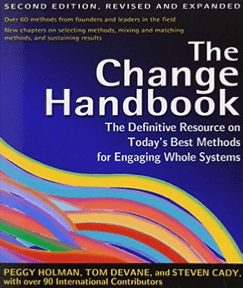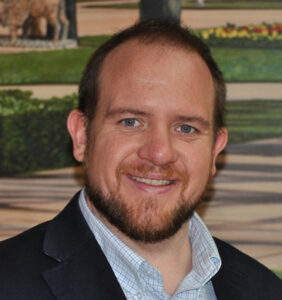Guest post by John Spalding and Steven Cady.
While most people would say they want change—in their organizations and communities, their schools, their health care, their government—they don’t often act on their desire because they don’t know where to begin. That’s why NEXUS4change provides a roadmap for initiating collaborative change in a changing world. NEXUS is both a curator for this emerging field of scholarship and practice, as well as a movement and gathering place for people with a passion to support “whole systems” to thrive in our world.
A path to a better world
The NEXUS4Change journey started in 2007 when Steve Cady, Bowling Green State University, co-authored the second edition of “The Change Handbook” with Peggy Holman and Tom Devane. Whole System Collaborative Change is based on two powerful premises: high involvement and a systematic approach to improvement. High involvement means getting everyone within the system involved in change. Then, all of the people, functions and ideas are systematically leveraged to create dramatic, sustainable change.
“It’s pretty straightforward. People support and defend that which they help to create,” Cady explains. “Here is the question for leaders of communities and organizations: who will you involve in the conversation? This is important because those who craft a picture and plan for the future are the ones who will end up getting it done. If leaders are the ones figuring it all out, then the implementation will likely end up on their personal to-do list. I think today’s leaders are looking for something different. They are looking to involve more and more people in a way that creates inspired action. NEXUS4Change provides the roadmap.”
The Change Handbook
 The Change Handbook is an index of more than sixty collaborative methods from around the world. Holman states, “In the seven years between editions, the field of whole system change exploded. Beyond the sheer number of methodologies, we found such passion for dramatic change. As we come to this time of many conflicts and questions, the deeply profound alternatives offered by whole system change clearly resonate with people who want to make a difference in the world.”
The Change Handbook is an index of more than sixty collaborative methods from around the world. Holman states, “In the seven years between editions, the field of whole system change exploded. Beyond the sheer number of methodologies, we found such passion for dramatic change. As we come to this time of many conflicts and questions, the deeply profound alternatives offered by whole system change clearly resonate with people who want to make a difference in the world.”
The methods they included in the handbook are from such diverse areas as urban planning and organization development to the applied arts and online technology. For example, there are new approaches such as Community Weaving, used to create social support networks, and long-established methods such as Future Search, which concentrates on bringing the right people together for an intensive study of a situation with a focus on finding common ground under complex conditions.
These approaches alone have been used effectively to provide outreach from Seattle to Texas for victims of Hurricane Katrina, and by such corporate giants as Ikea and government agencies such as the Federal Aviation Administration. Miners in South Africa used the World Cafe ® method to gather information about the organization and create amazing change. Each of these methods typically has a founder(s) and a group of other practicing professionals who share resources, stories, and best practices.
Underlying all the methods is an unyielding commitment to creating a better world through engaging whole communities and organizations. On working with the contributors to the book, Cady says: “As I listened to their stories, read their writings, and learned their approaches, I came away with hope and with the idea that an important conversation had started. The conversation was about an inspirational and practical message that was collectively emerging — NEXUS4Change — and the conversation needed to continue.”
Methods, Organizations, Issues
 Although spread out across the globe in a number of communities and organizations, Cady identified three key intersections in the current nexus for change in our world:
Although spread out across the globe in a number of communities and organizations, Cady identified three key intersections in the current nexus for change in our world:
1. Numerous critical challenges and possibilities at both local and global levels.
2. Organizations and communities working to address these issues.
3. A collection of whole system change methods to help organizations and communities meet these challenges.
He explains, “If these three intersections can be connected, a new course can be charted not just for the field of whole system change, but also for addressing critical needs and opportunities of the 21st century.”
“Working on our own, as valuable as that might be, we will never have the impact that working in concert on a large, movement-level scale might have,” as Peter Block, author of Flawless Consulting, stated.
NEXUS4Change – global engagement
NEXUS4change started with an initial conference and now has several ways for scholars, practitioners, leaders, students, and activists to interact with each other. The concept of nexus emerged from a discussion in which the original organizing group was considering what to call the first gathering. The notion of nexus emerged as an inclusive open gathering space – where the communities of practice around the world could convene on an international and interdisciplinary level.
The conference design, webinar resources, and whole system certification courses allow everyone to connect and be NEXUS4change. All persons who value collaboration on a large scale are invited to join and stay connected. The group has a passion for learning, discussing, and connecting individuals and organizations to these methods.
If not now, when? If not you, who?
Cady sums up NEXUS: “The Nexus for Change is here. New conversations and connections began in 2007 – leading to additional discoveries and insights. Scholars are working with practitioners to conduct research and bring scholarly objectivity to whole system collaborative processes. Practitioners are working with one another to deepen their individual practices, invent new applications and build cohesiveness within the field. Leaders are drawing upon tools and a growing body of evidence to guide their organizations. Practitioners and scholars are supporting the community leaders and activists as they strive to solve urgent challenges facing our world.”
 John Spalding concludes: “My commitment to collaboration, large group collaborative methods, and addressing critical global issues are the main tenants of NEXUS4change. We alone cannot make a difference that lasts. It is together, connecting our communities of practice in the nexus for collaborative change, that we will innovate a way forward that will make our mentors proud.”
John Spalding concludes: “My commitment to collaboration, large group collaborative methods, and addressing critical global issues are the main tenants of NEXUS4change. We alone cannot make a difference that lasts. It is together, connecting our communities of practice in the nexus for collaborative change, that we will innovate a way forward that will make our mentors proud.”
- How do you keep yourself updated with the latest change approaches and insights? Do you apply whole systems change tools?
- What have you learned from your practice as a change maker or leader? What tools are missing? What could you share with others?
- In addition to your job or business, what community or global challenges do you care for? How could you contribute to solving these challenges…?
John Spalding, is Managing Partner, and Dr. Steven Cady, is Founding Partner of NEXUS4change. Come to learn, share, and connect with other people yearning to create a better world at www.nexusforchange.org
Do you like this post? Please help me spread positivity by tweeting, sharing, and liking.
Marcella Bremer co-founded this blog and ocai-online.com. She’s an author and culture & change consultant.

This Post Has One Comment
The “NEXUS4change” premise, based on “an unyielding commitment to creating a better world through engaging whole communities and organizations”, is quite remarkable in and of itself. It will be interesting to see what evidence/ results the ongoing research will yield and how this will impact change leadership practices in the near future………